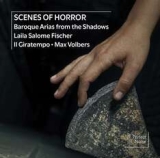Die Mezzosopranistin Laila Salome Fischer und das Ensemble Il Giratempo unter Leitung von Max Volbers haben sich das Album Scenes of Horror aufgeteilt. Es gibt darauf einige Arien sowie reine Orchesterstücke. Und nicht nur dank derer stiehlt das Ensemble der Sängerin die Show. Die Energie und die Farbenvielfalt, die ganze Gestaltungsphantasie, die vom Spiel von Il Giratempo ausgehen, findet sich in der relativ hell timbrierten und schmalen Stimme nicht, der es gerade im tiefen Register an Kraft und Präsenz und generell an Wärme fehlt.
Der Vergleich einiger Arien mit Aufnahmen von Cecilia Bartoli, Marilyn Horne oder auch von Countertenören wie Philippe Jaroussky und Franco Fagioli fallen nicht gerade zugunsten von Leila Salome Fischer aus. Wieso sich die Ausdruckskraft des Orchesters nicht auf die Sängerin übertragen hat, ist rätselhaft.
Die Aufnahme hätte im Übrigen auch die Stimme etwas besser herausstellen können.
Mezzo-soprano Laila Salome Fischer and the ensemble Il Giratempo under the direction of Max Volbers have subdivided the album Scenes of Horror. It contains several arias as well as purely orchestral pieces. And it is not only thanks to these that the ensemble steals the show from the singer. The energy and the variety of colors, the whole creative imagination that emanates from Il Giratempo’s playing, is not found in the relatively light timbred and narrow voice, which lacks power and presence and generally warmth, especially in the lower register.
A comparison of some arias with recordings by Cecilia Bartoli, Marilyn Horne or countertenors such as Philippe Jaroussky and Franco Fagioli does not exactly favor Leila Salome Fischer. It is a mystery why the expressive power of the orchestra was not transferred to the singer.
Incidentally, the recording could also have emphasized the voice a little better.
























